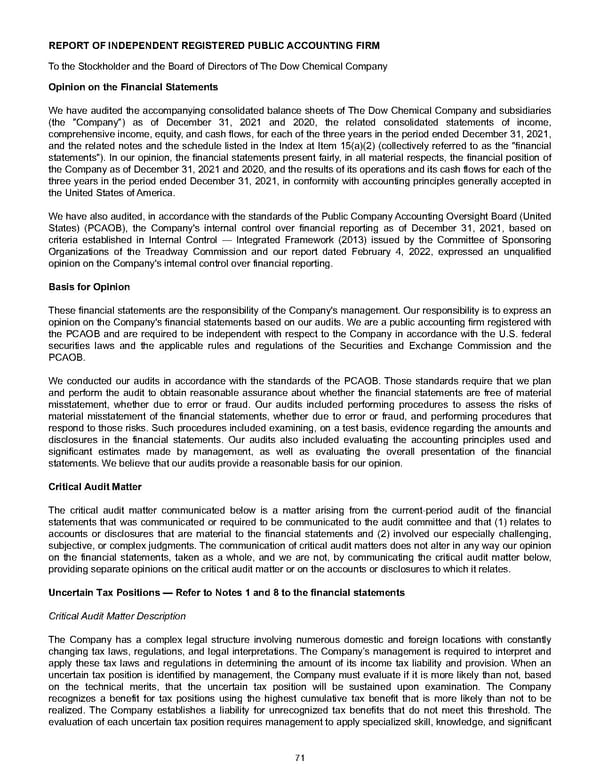REPORT OF INDEPENDENT REGISTERED PUBLIC ACCOUNTING FIRM To the Stockholder and the Board of Directors of The Dow Chemical Company Opinion on the Financial Statements We have audited the accompanying consolidated balance sheets of The Dow Chemical Company and subsidiaries (the "Company") as of December 31, 2021 and 2020, the related consolidated statements of income, comprehensive income, equity, and cash flows, for each of the three years in the period ended December 31, 2021, and the related notes and the schedule listed in the Index at Item 15(a)(2) (collectively referred to as the "financial statements"). In our opinion, the financial statements present fairly, in all material respects, the financial position of the Company as of December 31, 2021 and 2020, and the results of its operations and its cash flows for each of the three years in the period ended December 31, 2021, in conformity with accounting principles generally accepted in the United States of America. We have also audited, in accordance with the standards of the Public Company Accounting Oversight Board (United States) (PCAOB), the Company's internal control over financial reporting as of December 31, 2021, based on criteria established in Internal Control — Integrated Framework (2013) issued by the Committee of Sponsoring Organizations of the Treadway Commission and our report dated February 4, 2022, expressed an unqualified opinion on the Company's internal control over financial reporting. Basis for Opinion These financial statements are the responsibility of the Company's management. Our responsibility is to express an opinion on the Company's financial statements based on our audits. We are a public accounting firm registered with the PCAOB and are required to be independent with respect to the Company in accordance with the U.S. federal securities laws and the applicable rules and regulations of the Securities and Exchange Commission and the PCAOB. We conducted our audits in accordance with the standards of the PCAOB. Those standards require that we plan and perform the audit to obtain reasonable assurance about whether the financial statements are free of material misstatement, whether due to error or fraud. Our audits included performing procedures to assess the risks of material misstatement of the financial statements, whether due to error or fraud, and performing procedures that respond to those risks. Such procedures included examining, on a test basis, evidence regarding the amounts and disclosures in the financial statements. Our audits also included evaluating the accounting principles used and significant estimates made by management, as well as evaluating the overall presentation of the financial statements. We believe that our audits provide a reasonable basis for our opinion. Critical Audit Matter The critical audit matter communicated below is a matter arising from the current-period audit of the financial statements that was communicated or required to be communicated to the audit committee and that (1) relates to accounts or disclosures that are material to the financial statements and (2) involved our especially challenging, subjective, or complex judgments. The communication of critical audit matters does not alter in any way our opinion on the financial statements, taken as a whole, and we are not, by communicating the critical audit matter below, providing separate opinions on the critical audit matter or on the accounts or disclosures to which it relates. Uncertain Tax Positions — Refer to Notes 1 and 8 to the financial statements Critical Audit Matter Description The Company has a complex legal structure involving numerous domestic and foreign locations with constantly changing tax laws, regulations, and legal interpretations. The Company’s management is required to interpret and apply these tax laws and regulations in determining the amount of its income tax liability and provision. When an uncertain tax position is identified by management, the Company must evaluate if it is more likely than not, based on the technical merits, that the uncertain tax position will be sustained upon examination. The Company recognizes a benefit for tax positions using the highest cumulative tax benefit that is more likely than not to be realized. The Company establishes a liability for unrecognized tax benefits that do not meet this threshold. The evaluation of each uncertain tax position requires management to apply specialized skill, knowledge, and significant 71
 Annual Report Page 80 Page 82
Annual Report Page 80 Page 82